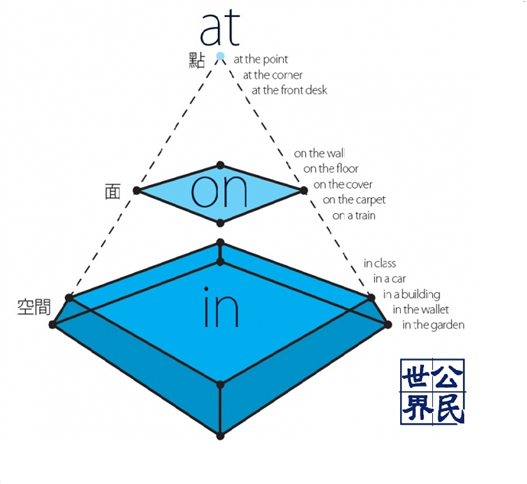01 你到底「在」哪裡
At是一个点。
假如你说某个人「at某个地方」,你一定找得到他,因为他就在那一点上。坐在桌子前,叫做sit at the table;和你约在某咖啡厅碰面,是meet you at the coffee shop;当然在某一个门牌号码前面,看着某人,很自然地也都是用at。
On是一个面。
我住在二楼,用I live on the second floor;在某条街上,想像站在那裡、抬头挺胸,是一种平面概念,用on the street;在火车、捷运的车箱上,你不是挤在一个空间裡,可以伸直腰,站在平面上,这是on。那在飞机上呢?
想想这个规则,on an airplane。
In是一个空间。
空间可以大到是宇宙、山川、国家、城市,也可以小到一个车子、杯子、眼睛,所以是in the mountains、in the river、in Taiwan、in Taipei、in a car……。

好,问题来了,有学生问,在办公室是in还是at?in和at都对,意思有些微差别:
I’ll meet you at the office.
(我们在办公室见。) 指地点。
I’m in my office.
(我正在工作。)
In不只是在办公室,而是做着在那个空间裡应该发生的事;好比in school是求学,in class是上课,in the office是办公。
有时候in和at用错了会让人会错意。我们经常讲的一句话,「请打电话到我办公室给我」。这句话要怎么说呢?in还是at?
Please call me ___ the office.
(请打电话到我办公室给我。)
Please call me at the office是正确的;当然也有比较直接的说法Please call my office,不要说please call me in the office,既像「你在办公室打给我」或「打电话到我的办公室」,又像「请你在办公室叫我一声」(两人可能在同一个办公室)。call也有「呼叫、喊叫」的意思。

02 at < on < in介係词的时间感
At表示特定的时间点。
想像时间是一条线,at就是线上的某个时间点,强调事情发生的那一刻,例如:
I got up at 7:00 this morning. (我今天早上7点起床。)
The miracle happened at that moment. (奇蹟在那一刻发生了。)
另外,表示一天中的某个时刻,不需加冠词,如at dawn、at midnight、at night。
On表示特定的日子或日期。
像是:Let’s have dinner on Friday. (我们礼拜五一起吃晚餐吧。)
His birthday is on the fourth of August. (他的生日在8月4日)
We are going to the party on Halloween. (万圣节当天我们会去参加派对。)
那为什么会有at Halloween呢?on Halloween是指万圣节当天,而at Halloween则是指在万圣节的期间。
In表示特定较长的时间。
如月份、年份、季节、时代、世纪,或一段时间。例如:
My uncle is going to retire in 2015. (我舅舅2015就要退休了。)
She started the job in August. (她在8月的时候就开始做这工作了。)
用in表示一段时间,如in my lifetime(在我的人生中);或是I will go to England in 2 weeks. (在2个礼拜内我就要去英国了。)
但in the night和at night又有什么不同?in the night指的是夜间,从日落到日出这个时段,at night则是指晚上,一天的某个时间点。

03 培养对介係词的感觉
为什么房间的门用the door of the room,门的钥匙却是the key to the door?究竟有没有个道理可循?
道理在「感觉」,不在「文法」。每一种语言都有一种自然演进的规律,这种规律,与其记规则,不如感受它;比方说,在车上,如果是汽车是in a car,公车是on a bus;记住这种感觉,如果你在交通工具裡要弯腰,就用in,in是包在裡头的感觉,如果是挺着身体走得进去,就是on。依此类推,在飞机上是in还是on?自然是on an airplane了。
现在一起来看看几个介係词给人的感觉:
(1) to/for
To是「朝着目标去」的感觉,目标明确,一定会到);for是「朝着一个方向去」的感觉,是一个大方向,并没有说一定会到。例如:Give the proposal to me. (将那计划书交给我。)「给(give)」这个动作必须要作用在”me”身上才算完成,所以用to。
I’ll buy it for you. (我会帮你买。) for指一个方向,不管有没有交给you,「买(buy)」的动作都已经完成,所以用for。
(2) with/by
With是「伴随着/在旁边」的感觉,by则是「靠…过去」的感觉。例如:
I will go with May. (我会和May一起去。)
因为with给人的感觉是「伴随着」,也就是「在旁边/拿在在手上」的意思,所以with可以解释作「利用…工具」,像是
I opened the door with a key. (我「用」一把钥匙开那扇门。) 或者
I am satisfied with the gift. (我很满意那个礼物。) 有这个gift,满足感随之而来。
I went there by train. (我搭火车到那裡。)
「靠…过去」是透过train这种交通工具抵达,不能用I went there “with” train,这样会变成「使用(手拿着)」train到那儿。
(3) of
是从属、包含、分离的概念。例如:
The table is made of glass. (桌子是由玻璃製成。)桌子是从玻璃中「分离出来的」。
如果说It is made “with” glass. 表示你拿glass当工具(伴随着/拿着),不合理。如果说It is made by wood. 表示wood是某个人,桌子是他做的,这也不合理。
回到最原始的问题:
这间房间的门the door of the room (O)
房门是房间的一部份,可以用of。
这扇门的钥匙the key of the door (X)
钥匙不是门的一部份,不能用of。
这扇门的钥匙the key to the door (O)
钥匙用来开门,是朝某目标而去的概念,用to就对了。
以这概念来说,这句话也对
通往房间的那扇门the door to the room (O)
也是朝着目标(房间)而去。
04 Up让句子更有力
介係词是句子中的精灵,它和动词组在一起,会增加动词的强度、亮度,使动词更具动感,像speak up就比单单speak有力。
我们一起来看以下的句子比较at、behind、by、on、with,这些小小的介係词真的起了「画龙点睛」的作用。
(1) 当我听到这事时,我简直不敢相信我的耳朵。
I couldn’t believe my ears when I heard this.
=> I couldn’t believe my ears at this.
(2) 她死后留下6个孩子。
She left six children after she died.
=> She left six children behind her.
(3) 如果需要帮助,打给我,号码是2721-5033。
If you need help, just ring me. My telephone number is 2721-5033.
=> If you need help, just call me at 2721-5033.
(4) 我们举杯庆祝他的成功。
We raise a toast to congratulate him on his great success.
=> We raise a toast to his great success.
(5) 这段文章生词太多,我要理解真是太难了。
There are so many new words in this passage, so it is hard for me to understand.
=> With so many new words, this passage is beyond me.
(6) 他因为30票之差输了竞选。
He lost the election because of 30 votes.
=> He lost the election by 30 votes.
(7) 证据对他不利。
The evidence is not good for him.
=> The evidence is against him.
(8) 我可以帮你完成这个专桉。
I can help you finish the project.
=> I can help you with the project.
(9) 我买单。
I’ll pay the bill.
=> It’s on me.


